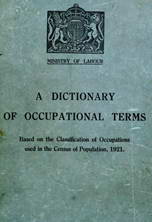A Dictionary of Occupational Terms Based on the Classification of Occupations used in the Census of Population, 1921.

ORDER II.—AGRICULTURAL OCCUPATIONS
Sub-order 1.—Agricultural Occupations
015.—Farm Bailiffs and Foremen
Back to List of Occupational Codes
- bailiff, farm bailiff, farm manager, farm Steward
; grieve
- a manager or head worker on farm or farms, who is mainly engaged in supervision and allocation of duties; superintends work of agricultural labourers, e.g. carters, cowman; is often placed in charge of subsidiary farm under the direct supervision of the employer and manages farm in absence of farmer (011) (q.v.); may buy and sell produce and equipment in market on owner's behalf.
- foreman
; headman
- (i) has charge of a number of labourers under direction of farmer (011) or farm bailiff (q.v.); allocates duties and supervises work; usually a working foreman;
- (ii) East Riding of Yorkshire ; has charge of a farm, or part of a farm, where employer is resident.
- gang master
- supervises or is master of gang of casual field hands hired by farmer; keens record of time worked or amount of work done, e.g. quantity of fruit or vegetables picked, by each worker.
- grieve
- Scotland, Northumberland, Cumberland and Yorkshire; see farm bailiff.
- ground keeper
- a farm bailiff or foreman (q.v.) residing on farm where farmer is non-resident.
- hayward of the manor
- looks after hedges and fences; prevents damage by cattle; impounds estrays; supervises work of hedger and ditcher (024) and sometimes of estate carpenter (474) (q.v.).
- headman
- see foreman.
- heath keeper
- keeps clear all drainage ditches on heathland with spade and rake; prevents unauthorised persons from shooting or poaching game or rabbits; gives warning of and attempts to stop heath fires; prevents refuse being dumped on the land.
- hind
- a farm servant, often living in his employer's house;
- (i) (North of England) takes charge of pair of horses, which he works, feeds and looks after;
- (ii) (some parts of North) assists the ploughman- steward (023) or headman (q.v.);
- (iii) (East Riding of Yorkshire) man in charge of farm where employer is not resident;
- (iv) a general utility man.
- husbandman
- (Welsh term); a farm worker experienced in all branches of farm work and able to plough, sow, reap, milk, tend sheep and cattle, thatch, repair ditches, etc.; usually acts as headman or foreman (q.v.).
- manager of stud farm
- manages farm where pedigree horses are bred and reared; gives instructions to and supervises work of stud grooms (023) (q.v.); is responsible for expenditure and for work done on the farm; keeps records of stock; work usually done by head groom.
- marsh bailiff
- overlooks cattle daily at grass on marshes for farmer who has leased the ground; patrols paths through marsh, makes periodical examination of fences, ditches, drains, etc., and reports any damage or necessary repairs.
Back to List of Occupational Codes
From:
A Dictionary of Occupational Terms Based on the Classification of Occupations used in the Census of Population, 1921,
Ministry of Labour, 1927. Digitised by Peter Christian, August, 2016. This text is in the Public Domain. 
